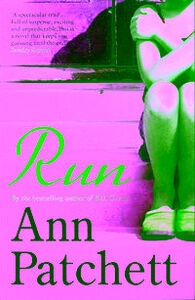You need to sign in or sign up before continuing.
Take a photo of a barcode or cover
challenging
emotional
funny
hopeful
sad
medium-paced
Plot or Character Driven:
A mix
Strong character development:
Yes
Loveable characters:
Yes
Diverse cast of characters:
Yes
Flaws of characters a main focus:
No
adventurous
emotional
hopeful
informative
reflective
medium-paced
emotional
inspiring
reflective
Strong character development:
Yes
Diverse cast of characters:
Yes
I enjoyed this book about family -- the one you're born into and the one you create. Every character is true to themselves and while it can take awhile each can appreciate the other even if they can't always understand them.
emotional
hopeful
reflective
medium-paced
Plot or Character Driven:
Character
Strong character development:
Yes
Loveable characters:
Yes
Diverse cast of characters:
Yes
Flaws of characters a main focus:
Yes
emotional
reflective
sad
slow-paced
I wanted to try an Ann Patchett book, but none of her popular ones appeal to me plot-wise, so when I saw Run at the used book store, and the jacket description was suitably vague/intriguing, I thought I'd give it a go.
We follow a Kennedy-esque widower who's the former mayor of Boston and his two adopted black sons, as well as the ne'er-do-well older brother, his biological son. In the middle of a January blizzard, an accident brings them crashing together with a black woman and her child, and secrets and tragedy unspool from there.
Most of the way through, I was asking, "Why?" Why is this scene so long? Why fish? Why this effing statue? Why are these two boys such unbelievable idiots about dangerously cold weather? Why are we torturing this poor woman?
I'm giving this two stars because the writing itself is lovely, and the sibling dynamics are interesting. But this is not the Ann Patchett to start with. At best, it's an underbaked family drama. At worst, it's another book by a white author wherein black pain and "sacrifice" do the heavy narrative lifting. This book reminds me of the movie Crash, which was allegedly a thoughtful look at racial dynamics in the US but was actually just reinforcing racial stereotypes all over the place. Thumbs down.
We follow a Kennedy-esque widower who's the former mayor of Boston and his two adopted black sons, as well as the ne'er-do-well older brother, his biological son. In the middle of a January blizzard, an accident brings them crashing together with a black woman and her child, and secrets and tragedy unspool from there.
Most of the way through, I was asking, "Why?" Why is this scene so long? Why fish? Why this effing statue? Why are these two boys such unbelievable idiots about dangerously cold weather? Why are we torturing this poor woman?
I'm giving this two stars because the writing itself is lovely, and the sibling dynamics are interesting. But this is not the Ann Patchett to start with. At best, it's an underbaked family drama. At worst, it's another book by a white author wherein black pain and "sacrifice" do the heavy narrative lifting. This book reminds me of the movie Crash, which was allegedly a thoughtful look at racial dynamics in the US but was actually just reinforcing racial stereotypes all over the place. Thumbs down.
Started out thinking it was interesting, but also kind of Masspoli-cliche heavy. And there are way too many convenient coincidences, and it would be silly to call this any sort of serious take on adoption, or race, etc. But there is some stellar writing, subtly rich characters, insight into privilege, all in all an enjoyable read. Plus my very favorite passage I've read, at least in recent memory, is found as a young girl runs.
Ann Patchett is my new favorite author. She's just sublime.
This novel was so unsatisfying I hardly know where to begin. But first, Patchett’s writing style—her choice of words, use of images—is excellent. There are sentences that sing and that’s what kept me reading, in addition to knowing I would have to discuss this book.
The flaws? The characters are barely imagined, stock caricatures of the rich white man and the poor black woman. So much more could have been said about these potentially interesting people. The adoption of two black boys by the Mayor of Boston and his wife raises all sorts of questions about the ethics of that decision. I think that the TV series, “This Is Us,” treats these questions with far greater sensitivity and awareness than Patchett has done in her novel. What about the reasons for Tennessee Moser to give up her boys, one at birth and the other one at age 14 months? The pressures on Tennessee must have been extreme to push her to this decision but we are never told what they were. And then her deathbed encounter with the real Tennessee Ann—so much is lacking that the reader hardly knows where this fits in the story.
The plot is contrived and contorted to make all of the ill-fitting pieces assume some sort of identity. The two characters who I found most interesting—both Sullivans, the priest and the older white son of Mayor Doyle—play only minor roles in the story and could have shouldered much more of the plot line. The carved angel that wants to play a central role is never invested with much power to move the story along, she just sits on the bedroom dresser awaiting her fate with the next heir.
I could not help compare this book with Jodi Picoult’s Small Great Things. Although they differ in the story they tell they are both efforts by white women to explore family relations across racial lines. Picoult’s novel is not without flaws but it is a sincere attempt to see past the cultural defaults of America, bred from a desire to truly feel the African-American in all of its injustice and inequality. Patchett never conveys such a desire or empathy.
The flaws? The characters are barely imagined, stock caricatures of the rich white man and the poor black woman. So much more could have been said about these potentially interesting people. The adoption of two black boys by the Mayor of Boston and his wife raises all sorts of questions about the ethics of that decision. I think that the TV series, “This Is Us,” treats these questions with far greater sensitivity and awareness than Patchett has done in her novel. What about the reasons for Tennessee Moser to give up her boys, one at birth and the other one at age 14 months? The pressures on Tennessee must have been extreme to push her to this decision but we are never told what they were. And then her deathbed encounter with the real Tennessee Ann—so much is lacking that the reader hardly knows where this fits in the story.
The plot is contrived and contorted to make all of the ill-fitting pieces assume some sort of identity. The two characters who I found most interesting—both Sullivans, the priest and the older white son of Mayor Doyle—play only minor roles in the story and could have shouldered much more of the plot line. The carved angel that wants to play a central role is never invested with much power to move the story along, she just sits on the bedroom dresser awaiting her fate with the next heir.
I could not help compare this book with Jodi Picoult’s Small Great Things. Although they differ in the story they tell they are both efforts by white women to explore family relations across racial lines. Picoult’s novel is not without flaws but it is a sincere attempt to see past the cultural defaults of America, bred from a desire to truly feel the African-American in all of its injustice and inequality. Patchett never conveys such a desire or empathy.
I gave it 3 stars because I wasn't super excited about the ending. I wanted more and it just kind of dropped off for me. Needed more closure I guess.



